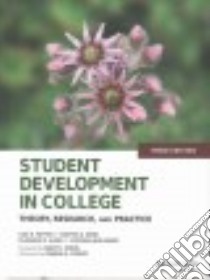- Libreria
- >
- Libri in lingua
- >
Student Development in College - 9781118821817
Un libro in lingua di Patton Lori D. Renn Kristen A. Guido Florence M. Quaye Stephen John Evans Nancy J. (FRW) edito da Jossey-Bass Inc Pub, 2016
- € 70.10
- Il prezzo è variabile in funzione del cambio della valuta d’origine
The third edition of Student Development in College presents practitioners, scholars, and graduate students with the most recent information pertaining to student development theory, research, and its application to practice. Considered the key resource for those most committed to conscious and intentional student affairs practice, this updated third edition offers several new features:
- A condensed version of student development history, which now draws connections between student learning and student development and expands on theoretical worldviews and paradigms that have been used to guide the development and construction of theory. It also introduces an integrative framework to help readers view theory and student development in a more holistic, integrated, and complex way.
- Social identities take a central focus and include the addition of three new chapters focusing on social class; disability; and emerging theoretical perspectives that highlight generational and age identity, national identity, and digital identity. The chapter focusing on faith and spirituality includes information on religious, atheist, and agnostic identities. The chapter on gender is also updated with the latest research on men and masculinities.
- Part Three offers a combined emphasis on psychosocial and cognitive-structural theories, with some information being condensed and revised to allow self-authorship to be used as an anchoring theory to present a more integrated approach to viewing identity as a meaning-making process that involves both psychosocial and cognitive processes.
- Part Four introduces new strategies for student affairs practitioners to engage in difficult dialogues about theories, teaching theory, and the importance of being reflective educators and consumers of theory.
- New vignettes of key characters’ storylines are woven throughout the chapters, allowing readers to witness the developmental trajectories of the characters as they move from chapter to chapter.
- Each chapter concludes with a set of discussion and reflection questions for readers to consider.
- A supplemental downloadable instruction guide connects information from the book with sound teaching strategies and ideas that can be implemented to enhance learning environments.
Informazioni bibliografiche
- Titolo del Libro in lingua: Student Development in College
- Sottotitolo: Theory, Research, and Practice
- Lingua: English
- Autori : Patton Lori D. Renn Kristen A. Guido Florence M. Quaye Stephen John Evans Nancy J. (FRW)
- Editore: Jossey-Bass Inc Pub
- Collana: Jossey-Bass Inc Pub (Hardcover)
- Data di Pubblicazione: 29 Febbraio '16
- Genere: EDUCATION
- Argomenti : College student development programs United States College students United States Psychology
- Pagine: 536
- Dimensioni mm: 241 x 177 x 38
- ISBN-10: 1118821815
- EAN-13: 9781118821817


